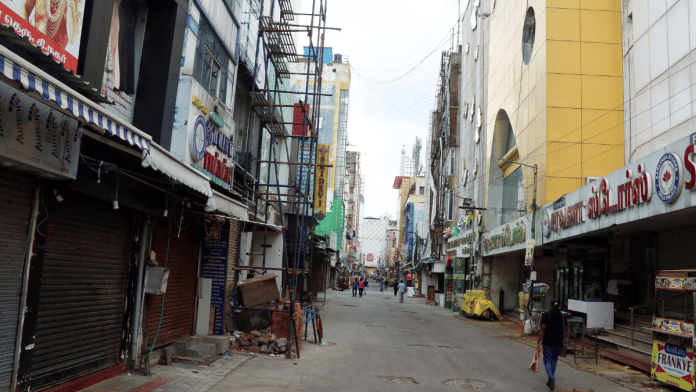New Delhi: In a major relief to Tamil Nadu shopkeepers and traders who have taken government premises on lease, the Supreme Court has refused to set aside the Madras High Court order that directed the state government to waive rent for the entire Covid lockdown period in 2020.
A bench led by Justices Abhay S. Oka and Ujjal Bhuyan dismissed a set of appeals filed by various municipal bodies of Tamil Nadu that had challenged multiple High Court (HC) orders passed in 2022.
These orders were delivered by a two-judge HC bench, upholding orders of single-judge benches given in individual cases where shopkeepers wanted a waiver of rent from April 2020 to September 2020. These shopkeepers had approached the HC following the state’s refusal to accept their request to modify its order that restricted waiver of rent only to two months – April and May 2020.
Almost three years after the civic agencies approached the top court assailing the HC orders, the SC put its stamp of approval.
On 12 February, while dealing with one of the appeals that was treated as the lead matter, the SC said the HC had taken a “very equitable view of the matter” for protecting those who could not carry on their business during the lockdown.
“Hence, no case for interference is made out in exercise of our jurisdiction under Article 136 of the Constitution of India,” it said. Article 136 deals with the top court’s power to hear appeals.
Dismissing the appeals, the bench also ordered the state to reimburse the lease money collected during the June-September 2020 period and fixed a three-month deadline to abide by the order. “It is for the petitioners to seek reimbursement from the Government, if the petitioners are so entitled,” the bench ordered.
The municipal bodies had moved the top court after the HC, in a series of judgements, declined relief to them against orders passed by various single-judge benches. The orders under challenge had come on petitions filed by shopkeepers and small-scale merchants, who have taken on lease government premises to run businesses.
In contention was the Tamil Nadu government’s 2 September, 2020 administrative decision to waive rent for only two months during the Covid lockdown. This was done on the basis of proposals that it received in June 2020 from its municipal corporations, urging the state to give concessions to the traders who had no source of livelihood in view of the complete lockdown.
The September 2020 order was applicable to all shops and stalls owned by the local bodies involving 15 municipal corporations, 121 municipalities and 528 town panchayats. Given that the state turned down the request to extend the concession to remaining four months – June to September, 2020, several traders moved the HC and received favorable orders.
While challenging each order, through a separate appeal, before the HC division bench, the state asserted its decision-making authority, claiming it was a policy matter on which the court could not have exercised its jurisdiction.
However, the HC declined to entertain the appeals on the ground the Covid lockdown was imposed in “extraordinary circumstances” that cannot be met with by ordinary measures. It prevented everyone from going out to earn and spend money, the HC had said.
The HC also noted that the proposal by different municipal corporations to waive the lease amount was sent in June 2020, without considering the eventualities of the months coming thereafter. The suggestions were based on the lockdown faced in April and May 2020, it said.
Since there was no change of circumstances for the remaining period of the lockdown, up to September 2020, the HC directed the government to extend the concession to the other four months as well. The state, it said, should have on its own taken care of its citizens.
After losing its appeals, the state moved the top court where it reiterated the judiciary’s lack of jurisdiction and contended the HC order was inconsistent with its policy. The state highlighted tender conditions, which stipulate that in the event of default of payment of rent or license fee, no concession would be granted under any circumstances, which included the pandemic as well.
Advocate Ram Shankar, who appeared for a trader in the SC, told ThePrint that the work and business of shopkeepers, particularly the small merchants, came to a standstill due to the lockdown.
“Their contract was with a state instrumentality and the state itself had chosen, like other state governments, to treat the lockdown restrictions as a force majeure event. But then they relieved the licensees from the obligation to pay the fees only for two months. The reason for granting waiver for two months would equally hold good for the entire total lockdown,” he explained.
Though the top court dismissed the appeals, it left the question of law on the court’s power to intervene in a policy matter of such a nature open.
It also refused to acknowledge the state’s order of June 2023 that announced protection to those traders who received favorable HC orders and agreed to refund the lease money that was collected for the June-September 2020 period. On the basis of this order, the state had urged the apex court to overrule the HC decisions.
“After having found that the High Court has passed an equitable order protecting the interests of the persons who were prevented from carrying on business due to lockdown, we are of the view that on the basis of the Government Order referred above, no interference can be made with the impugned order,” the apex court said.
(Edited by Tony Rai)
Also Read: SC order ends row over Chhattisgarh pastor’s burial, but judges divided. What they said






